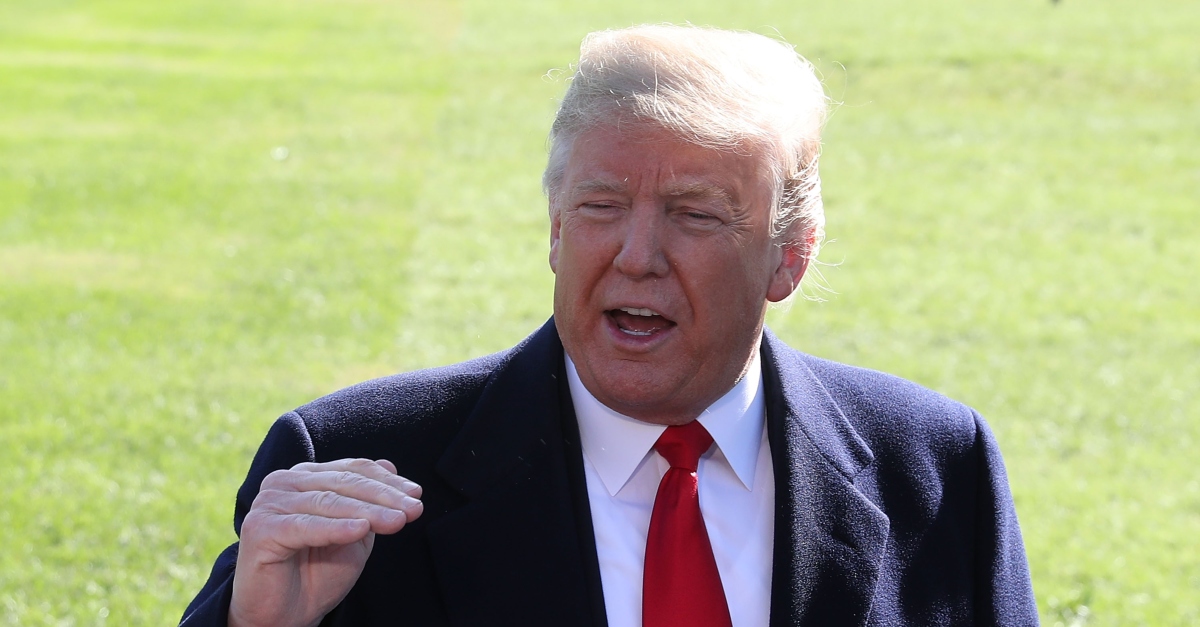
If special counsel Robert Mueller is seriously pursuing an obstruction of justice case against President Donald Trump, then you can bet that information revealed in the New York Times‘ latest bombshell report will be cited in court documents.
The Times reported on Tuesday that President Trump wanted to “order” the Department of Justice to prosecute former Secretary of State Hillary Clinton and fired FBI director James Comey. It should be mentioned up front that former White House counsel Don McGahn was credited with steering Trump away from such an order, arguing that it could inevitably lead to Trump’s impeachment. Notably, McGahn, has reportedly cooperated “extensively” with Mueller’s investigation.
MSNBC’s Ari Melber put the implications of that this way:
CNN legal analyst and attorney Ross Garber agreed that McGahn’s “cooperation with Mueller will turn out to be one of the most consequential parts of the investigation, at least on the obstruction issue.”
McGahn, even more notably, denied through his attorney that he had knowledge that Trump ever made such an order.
William A. Burck told the Times that McGahn was not going to comment on the legal advice he’s given to the president. Still, Burck said, “the president never, to his knowledge, ordered that anyone prosecute Hillary Clinton or James Comey.”
The interesting thing about this comment is that it’s quite blatantly a non-denial denial. The Times reported that Trump wanted to order a prosecution. McGahn said that Trump never, to his knowledge, ordered a politically-motivated prosecution. The distinction is important.
As has been reported previously, Mueller has reportedly looked into Trump’s tweets and other public statements targeting former FBI director Comey, former FBI deputy director Andrew McCabe, and former U.S. Attorney General Jeff Sessions. In August, one tweet from Trump said that Sessions, who famously recused himself from the Russia investigation, “should stop this Rigged Witch Hunt right now, before it continues to stain our country any further.”
Former federal prosecutor Renato Mariotti argued at the time that this kind of tweet demonstrated “corrupt intent,” and was “among the many reasons why Mueller will conclude Trump obstructed justice.” Mariotti would add that Mueller and his prosecutors would have looked at that tweet and thought, “They think this is more evidence of corrupt intent. … adding more tabs to their exhibit binder.”
Now, Jeff Sessions is out of the picture and has been replaced by acting Attorney General Matthew Whitaker, whose public statements on CNN in various forms indicated that Whitaker was more than a mere skeptic of the Mueller Probe. He said that Mueller may have gone “too far” and even used the president’s own words (“witch hunt”) to describe it.
As this Whitaker controversy is still brewing, the New York Times is providing information that could, in the same way as the aforementioned tweet, be seen as demonstrative proof of “corrupt intent.” A prosecutor could persuasively argue that if Trump would suggest prosecuting Comey for his handling of the Clinton email probe, it stands to reason that Trump would fire Comey because of the Russia investigation.
It just so happens that two days after firing Comey, Trump infamously said the following to NBC’s Lester Holt on Comey’s ouster:
And, in fact, when I decided to just do it, I said to myself, I said: ‘You know, this Russia thing with Trump and Russia is a made up story, it’s an excuse by the Democrats for having lost an election that they should’ve won.
Trump quickly walked that back.
Except, Trump himself pushed that narrative.
18 U.S.C. § 1503 defines obstruction of justice as: “an act that ‘corruptly or by threats or force, or by any threatening letter or communication, influences, obstructs, or impedes, or endeavors to influence, obstruct, or impede, the due administration of justice.'”
How else is one to interpret the desire to order the prosecution of political opponents, one of whom was the director of the FBI and asking questions about Russia and the Steele Dossier?
It is notable that Mueller’s written questions for Trump reportedly did not address obstruction of justice.
Constitutional law expert and George Washington University School of Law Prof. Jonathan Turley argued as recently as Saturday that the lack of obstruction questions could mean that Mueller isn’t seriously pursuing that line of investigation. Trump, Rudy Giuliani and the rest of legal squad have wrestled with the special counsel over which questions would be asked and how. They have resisted obstruction-related questions. However, Turley also said the special counsel’s tactic could mean something “horrific.”
“[I]t could mean that, given White House opposition to obstruction questions, Mueller will leave that matter to the Congress after he issues his special counsel report,” Turley said.
If that’s the case, you can also bet that this latest New York Times story will be remembered by a House of Representatives controlled by Democrats starting in 2019. It could also be the case that Mueller isn’t asking any of these questions because he already knows the answers.
It is also somewhat amusing to note that if McGahn really warned Trump he could be impeached if he ever ordered the prosecution of Comey or Clinton, it may still be true that the expressed desire to do so can and will be used against Trump. You can bet this Times story would also be mentioned in an impeachment proceeding.
National security lawyer Bradley P. Moss told Law&Crime that “If there ever are Articles of Impeachment (and that is not a foregone conclusion), these types of episodes,” as chronicled by the Times, “will be listed under the category ‘abuse of power.'”
Editor’s note: The headline was updated after publication for clarity.
[Image via Mark Wilson/Getty Images]